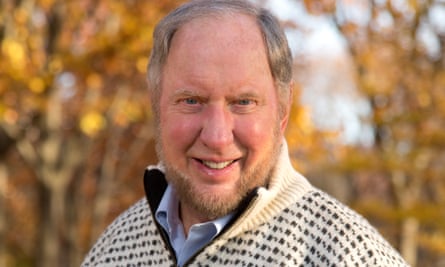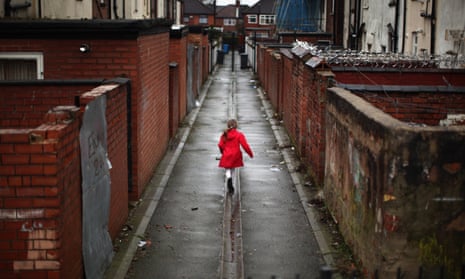Lost beneath the waves of the terrible floods this Christmas was coverage of another startlingly depressing story. New research from the Fabian Society revealed the prospect of significantly sharper inequality heading Britain’s way. And with cuts falling disproportionately on single parents, this means the number of children living in poverty will rise from [pdf] 2.5 million (19%) to 4.4 million (28%) by 2030.
The combination of the Conservatives’ austerity agenda and accelerating socioeconomic trends means inequality remains the defining political issue of contemporary Britain. But since the general election, both the Labour frontbench and government ministers have been far too quiet on the subject.
Instead, the agenda is now being driven by the Harvard sociologist Robert Putnam, whose remarkable book Our Kids: The American Dream in Crisis is being consulted by Republican leaders in Congress as well as Hillary Clinton’s leadership team. It is time we took seriously his account here as well. For what Our Kids shows is the desperate need to move discussion of disadvantage and social mobility beyond the school gate into the much more vexed territory of family, parenting, community and economic injustice.
With a mix of hard data and personal narrative, Putnam brings to life – with an anger and critical analysis matched by few other authors – the terrible social consequences of runaway inequality and how, with it, the US has lost a sense of shared responsibility.
He does so by returning to the Port Clinton, Ohio, of his 1950s upbringing to describe high levels of educational expansion and income equality alongside low levels of class segregation in schools and marriage. He says: “Opportunities for kids born in the lower echelon to scale the socioeconomic ladder were abundant … children of manual workers and of professionals came from similar homes and mixed unselfconsciously in schools and neighbourhoods, in scout troops and church groups.”
So, Don, the working-class son of a dad in a canning plant, could make it to college and then into a successful career as a Protestant minister. Frank, the wealthy kid, who lived four blocks from Don, built a career as a journalist through similar pathways. The life stories of Jesse and Cheryl, the two African American members of the class, were not dissimilar, even in the face of 1950s racism. In 21st-century Port Clinton a manufacturing collapse and the emergence of a new upper class have ripped that civic cohesion apart. So now Chelsea, the daughter of a sales manager and “grade hound” mom, lives “in a large white home with a wide porch overlooking the lake” and is on her way to law school. By contrast, David, the son of a jailbird dad, has nine half-siblings, witnessed far too much drugs and domestic abuse for any child and has dropped out of school. The opportunity gap has widened dramatically, partly because affluent children enjoy more advantages than they did then, but mostly because poor children now are in much worse shape than their counterparts then. Forty years of growing inequality and accumulated wealth are rupturing the foundations of the American dream. In the land of opportunity, the latest educational longitudinal study shows high-scoring poor kids are now less likely to get a college degree than low-scoring rich kids. In short, privilege is a stronger predictor of college graduation than high school attainment.
There is everything to suggest a similar process is at work in the UK. It is becoming ever more apparent in 21st-century Britain that children need to choose their parents wisely as income, wealth and class inequality accelerate.
For conservative policymakers on both sides of the Atlantic, the answer to declining social mobility has been radical school reform. Charter schools in the US and free schools in England were the magic bullets. Just get the poor kids in front of a “champion teacher” such as Doug Lemov and all will be well.

There is much to be said about the importance of ensuring low-income communities have access to high-quality teaching. But we are placing more and more responsibilities on schools to solve society’s ills – as we shy away from family policy, dismantle the social work system, ignore the impact of labour market changes, and refuse to discuss housing and catchment areas. It’s not just the government. In the UK, parents, local authorities, charities, the media and politicians have all bought into the schools-can-fix-it narrative.
As Putnam argues: “Once we account for non-school factors (such as family structure, economic insecurity, parental engagement and even TV watching), school quality and school resources themselves seem to contribute relatively little to class gaps in test scores.”
The lesson is that schools work as part of a much broader social ecology of churches, clubs, sports leagues and work placements. A rich network of civic capital offered “our kids” trusting interactions with non-parental adults that socialised them and ensured failure did not have to be fatal. It provided the conditions for that holy grail of current education policy: the development of character, resilience and grit.
So, what can be done to reverse the trend? An early-years policy focused on affordable, high-quality, centre-based day care for low-income families is essential to tackle disadvantage. Rather than closing Sure Start centres and sacking community nurses, the government should be focusing on improving the skills and reach of the pre-school sector. And a Scandinavian-style universal childcare [pdf] system would be a fine progressive ambition for a Labour party keen to flex its radical muscles.
Second, as Labour argued at the election, high-class technical and vocational education is a social justice calling. Low-income students should never be forced down a non-academic pathway, but we need to do much better in providing teenagers who find mainstream schooling a challenge decent alternatives. Rather than closing further education colleges and giving university technical colleges the cold shoulder, the government should set about renewing their entire purpose.
Finally, extracurricular activities. Putnam is adamant on this. The teamwork, self-discipline and leadership that come with arts, sports and drama result in “higher grade-point averages, lower dropout rates, lower truancy … higher educational aspirations, greater self-esteem, more civic engagement”.
The Tories came into power hoping to expunge all Labour’s “nonsense” about soft skills and social and emotional learning – now the finest minds in the world have shown how essential they are. Schools and teachers certainly can do more to prioritise extracurricular enrichment – but a little breathing space from a compliance-focused inspectorate would help. No more buses at 2.55pm, and sports and music regarded as optional extras. But it is also time for parents and community groups to do some heavy lifting if “our kids” are going to flourish.
Without radical political change, inequality will continue to escalate. In fact, the forces of globalisation, technological change, labour market deregulation and family breakdown mean the pace of inequality is going to accelerate. And if we can’t – or don’t want to – go back to 1950s America for the answer, we do have to start thinking about how to confront disadvantage beyond the narrow confines of the school gate.
